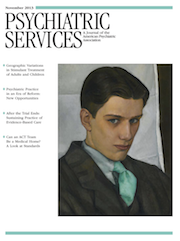War Is Not the Answer: In Reply
In Reply: I was moved to respond to the heartfelt letter from Mona Wasow, rather that follow the more traditional path of asking for a response from the authors of the studies cited in her comments. I have considerable sympathy with the sentiments of Professor Wasow that “war is not the answer.” Except that sometimes war has been the response to some set of world events, and then we are faced with the behavioral consequences of the resulting conflict. I made a point similar to Professor Wasow’s when I was asked to review the excellent RAND report, Invisible Wounds of War (1), on the recent Gulf Wars. Namely, I suggested that the best way to prevent these injuries and wounds is to avoid unnecessary wars.
As the son of a decorated battalion surgeon in a combat infantry unit in World War II, I learned much from him about the horrors of war, because he talked to me about them from the time I was quite young. Later I learned that combat veterans do not talk about wartime events, which did not comport with my own experience with my father. Only many years later, when I listened to the comments of Vietnam veterans, did I realize that combat soldiers avoid talking about their war experiences not because of the horror of war, per se, but because of a profound sense of guilt over having been a participant in the violence. My father had been there as a healer and had no sense of being a perpetrator of that horror, even if he was a cog in the war machine. He was able to talk and share the experience with me. As a result, I chose to serve as a Commissioned Officer in the U.S. Public Health Service—at a safe distance at the National Institute of Mental Health.
From my father and from my own service, I learned to respect veterans of all stripes and understood how important it would be to help them heal from the invisible wounds of war that drive many of them to suicide. I publish this letter from Mona Wasow to give voice to her sentiments for peace.
1 (eds): Invisible Wounds of War: Psychological and Cognitive Injuries, Their Consequences, and Services to Assist Recovery. Santa Monica, Calif, RAND Corp, 2008Google Scholar



